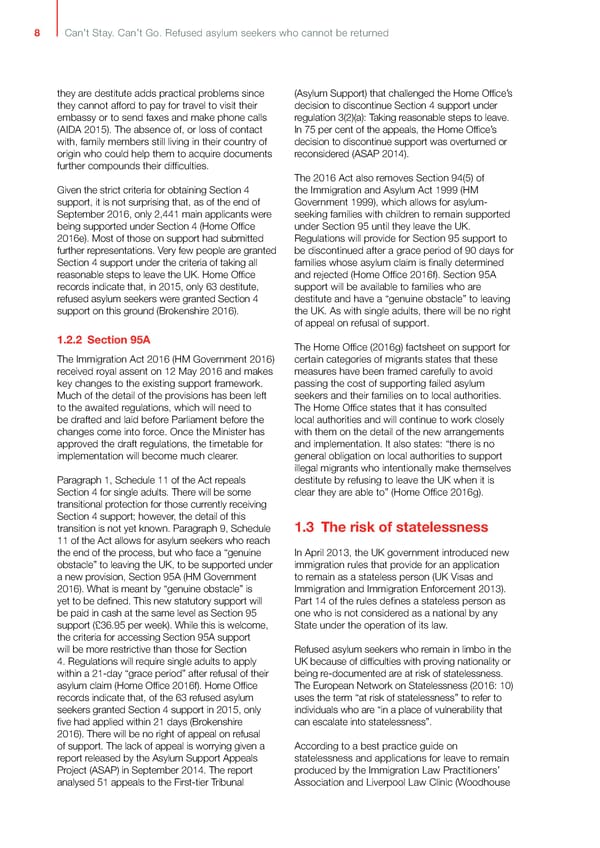8 Can’t Stay. Can’t Go. Refused asylum seekers who cannot be returned they are destitute adds practical problems since (Asylum Support) that challenged the Home Office’s they cannot afford to pay for travel to visit their decision to discontinue Section 4 support under embassy or to send faxes and make phone calls regulation 3(2)(a): Taking reasonable steps to leave. (AIDA 2015). The absence of, or loss of contact In 75 per cent of the appeals, the Home Office’s with, family members still living in their country of decision to discontinue support was overturned or origin who could help them to acquire documents reconsidered (ASAP 2014). further compounds their difficulties. The 2016 Act also removes Section 94(5) of Given the strict criteria for obtaining Section 4 the Immigration and Asylum Act 1999 (HM support, it is not surprising that, as of the end of Government 1999), which allows for asylum- September 2016, only 2,441 main applicants were seeking families with children to remain supported being supported under Section 4 (Home Office under Section 95 until they leave the UK. 2016e). Most of those on support had submitted Regulations will provide for Section 95 support to further representations. Very few people are granted be discontinued after a grace period of 90 days for Section 4 support under the criteria of taking all families whose asylum claim is finally determined reasonable steps to leave the UK. Home Office and rejected (Home Office 2016f). Section 95A records indicate that, in 2015, only 63 destitute, support will be available to families who are refused asylum seekers were granted Section 4 destitute and have a “genuine obstacle” to leaving support on this ground (Brokenshire 2016). the UK. As with single adults, there will be no right of appeal on refusal of support. 1.2.2 Section 95A The Home Office (2016g) factsheet on support for The Immigration Act 2016 (HM Government 2016) certain categories of migrants states that these received royal assent on 12 May 2016 and makes measures have been framed carefully to avoid key changes to the existing support framework. passing the cost of supporting failed asylum Much of the detail of the provisions has been left seekers and their families on to local authorities. to the awaited regulations, which will need to The Home Office states that it has consulted be drafted and laid before Parliament before the local authorities and will continue to work closely changes come into force. Once the Minister has with them on the detail of the new arrangements approved the draft regulations, the timetable for and implementation. It also states: “there is no implementation will become much clearer. general obligation on local authorities to support illegal migrants who intentionally make themselves Paragraph 1, Schedule 11 of the Act repeals destitute by refusing to leave the UK when it is Section 4 for single adults. There will be some clear they are able to” (Home Office 2016g). transitional protection for those currently receiving Section 4 support; however, the detail of this transition is not yet known. Paragraph 9, Schedule 1.3 The risk of statelessness 11 of the Act allows for asylum seekers who reach the end of the process, but who face a “genuine In April 2013, the UK government introduced new obstacle” to leaving the UK, to be supported under immigration rules that provide for an application a new provision, Section 95A (HM Government to remain as a stateless person (UK Visas and 2016). What is meant by “genuine obstacle” is Immigration and Immigration Enforcement 2013). yet to be defined. This new statutory support will Part 14 of the rules defines a stateless person as be paid in cash at the same level as Section 95 one who is not considered as a national by any support (£36.95 per week). While this is welcome, State under the operation of its law. the criteria for accessing Section 95A support will be more restrictive than those for Section Refused asylum seekers who remain in limbo in the 4. Regulations will require single adults to apply UK because of difficulties with proving nationality or within a 21-day “grace period” after refusal of their being re-documented are at risk of statelessness. asylum claim (Home Office 2016f). Home Office The European Network on Statelessness (2016: 10) records indicate that, of the 63 refused asylum uses the term “at risk of statelessness” to refer to seekers granted Section 4 support in 2015, only individuals who are “in a place of vulnerability that five had applied within 21 days (Brokenshire can escalate into statelessness”. 2016). There will be no right of appeal on refusal of support. The lack of appeal is worrying given a According to a best practice guide on report released by the Asylum Support Appeals statelessness and applications for leave to remain Project (ASAP) in September 2014. The report produced by the Immigration Law Practitioners’ analysed 51 appeals to the First-tier Tribunal Association and Liverpool Law Clinic (Woodhouse
 Can't Stay Can't Go Page 13 Page 15
Can't Stay Can't Go Page 13 Page 15